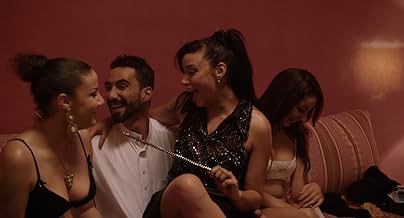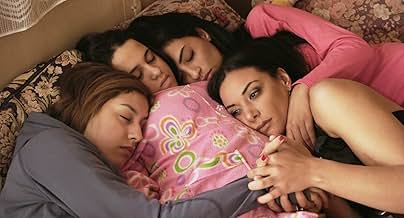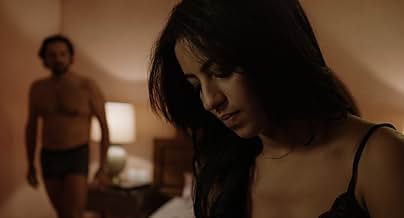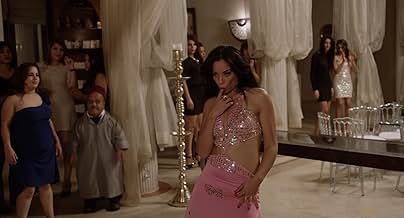Much Loved
- 2015
- 1h 44min
CALIFICACIÓN DE IMDb
6.2/10
3.2 k
TU CALIFICACIÓN
Un grupo de mujeres en Marruecos se ganan la vida como prostitutas, en una cultura que es muy implacable con las mujeres que tienen esa profesión.Un grupo de mujeres en Marruecos se ganan la vida como prostitutas, en una cultura que es muy implacable con las mujeres que tienen esa profesión.Un grupo de mujeres en Marruecos se ganan la vida como prostitutas, en una cultura que es muy implacable con las mujeres que tienen esa profesión.
- Dirección
- Guionista
- Elenco
- Premios
- 3 premios ganados y 4 nominaciones en total
- Dirección
- Guionista
- Todo el elenco y el equipo
- Producción, taquilla y más en IMDbPro
Opiniones destacadas
I appreciate how un-judgmental Ayouch is in his 'Much Loved' – a portrait of 4 young prostitutes living together in Marrakech, going to parties with Saudi sheikhs to dance for and ultimate have sex with the men. At the same time they function as a kind of family to hold the world at bay and provide for each other the human tenderness all humans need. (Their real families have rejected them, or left Morocco or died)
The film making never feels exploitive or melodramatic. The life of a medium level hooker in Morocco is shown as neither glamorous nor the depth of hell. It's tough, it's sad, it's degrading, and yet it's clear the world isn't brimming with other ways for these women to make good money, and to live – kinda, sorta – on their own terms. It's also a powerful cry against the abuse of these women in particular but also all women (and gay men) in Morroccos patriarchal society.
On the other hand, I feel like I've been here before more artfully. For example, Paul Thomas Anderson explored how porn stars and crews became each others extended family in "Boogie Nights", but did it with more style, and ultimately more insight and emotion. Whether Lizzie Borden's 'Working Girls' or many other examples, this is hardly new territory if you're not digging deeper than this film does.
Clearly Ayouch is drawn to the outsiders on the edge of society. The three films of his I've seen dealt with; street urchins trying to bury a murdered friend, young boys being trained as terrorists, and now prostitutes. But there's more to exploring these worlds than being real and accepting. For me, all three films (the other two being "Ali Zaoua: Prince of the Streets" and "Horses of God") while admirable in intent, ultimately didn't go deep enough, and risk feeling like the movie equivalent of an old US 'liberal' TV movie. There's more to really understanding than a lack of moralistic preaching, or accepting the basic humanity of those whom some would deny.
Still, it's well acted, and I appreciated the nice touches of humor and humanity. I just wish it was great.
The film making never feels exploitive or melodramatic. The life of a medium level hooker in Morocco is shown as neither glamorous nor the depth of hell. It's tough, it's sad, it's degrading, and yet it's clear the world isn't brimming with other ways for these women to make good money, and to live – kinda, sorta – on their own terms. It's also a powerful cry against the abuse of these women in particular but also all women (and gay men) in Morroccos patriarchal society.
On the other hand, I feel like I've been here before more artfully. For example, Paul Thomas Anderson explored how porn stars and crews became each others extended family in "Boogie Nights", but did it with more style, and ultimately more insight and emotion. Whether Lizzie Borden's 'Working Girls' or many other examples, this is hardly new territory if you're not digging deeper than this film does.
Clearly Ayouch is drawn to the outsiders on the edge of society. The three films of his I've seen dealt with; street urchins trying to bury a murdered friend, young boys being trained as terrorists, and now prostitutes. But there's more to exploring these worlds than being real and accepting. For me, all three films (the other two being "Ali Zaoua: Prince of the Streets" and "Horses of God") while admirable in intent, ultimately didn't go deep enough, and risk feeling like the movie equivalent of an old US 'liberal' TV movie. There's more to really understanding than a lack of moralistic preaching, or accepting the basic humanity of those whom some would deny.
Still, it's well acted, and I appreciated the nice touches of humor and humanity. I just wish it was great.
One can easily see some good 'bad publicity' in the controversy surrounding "Much Loved" and its theatrical ban from Morocco, but it also lead to violent attacks against its main star Lubna Abidar, as if reality had overshadowed fiction, which says a lot.
I'm Moroccan and I avoided the film for a series of wrong reasons that seemed right at that time. My brother warned me that it was an exercise in pornography and shock for the sake of shocking. I suspected Nabil Ayouch made a deliberately graphic film, orchestrating the very polemic it caused while shielding his marketing ambitions with "cinema verité" and Abidar was the sacrificial lamb. As if things weren't bad enough for Arabs in 2015, did we need a film to highlight our own hypocrisy with the taboo of sex and prostitution? That's how I was thinking, failing to realize that if Abidar was treated like a wh**** , that totally justified a film about women constantly regarded as below the standards of human dignity.
The film doesn't dignify prostitution but exposes it in its naked (or half-naked) opening with a long conversation that sets the tone. The subtitles do their jobs al by telling you what they say and they don't sugarcoat the profanities. However they might affect a Moroccan viewer who'd never hear a girl use these terms in society. I remembered my cousin telling me that boys have no idea how girls talk when they're together, I was shocked at the thought that they used the same words to define anatomical attributes, but hey, what was I expecting?. As Abidar's character Noha tells her chauffeur : "do you expect us to talk in poetry?".
But there's more beyond the first verbal shock, these girls talk about their customers and seem to enjoy the moment because just for once, men become the objects ... of mockeries and laughs. You can tell that these conversations have a sort of cathartic effect and operate like a little pep talk before action, when their chauffeur Said, played effectively by a laconic Abdellah Didane drives them to a nightclub without paying attention. It's a movie about sex workers and naturally, they don't operate by themselves, they know cab drivers, bouncers, barmen, cops and like in Scorsese's "Casino", we see all the ramifications of the underworld.
The first act culminates in an extended orgy with a group of inebriated Saudis, there's no need describing every detail but while I was watching these girls humiliating themselves, shaking their bottoms, playing with their bodies, I was thinking "why would anyone dismiss this film?" "how could it show that reality otherwise?". No 'good' citizen is aware of the existence of these practices, and it's a long overdue wake-up call for Moroccan society to realize the collateral damages of tourism. I'm sad that one of the reputations that Moroccan girls brought to themselves was how 'easy' they are, making a city like Marrakesh the Mecca of ... and yes, I'm censoring myself.
But Ayouch avoids the victim card and acknowledges that for some girl it's a choice driven by economical needs but a choice nevertheless, if they want to leave the great life or open a business (a former pro opened a hair salon after making money in the whole Middle-East... and she wasn't a housemaid). These girls have ambitions and personalities of their own, their solidarity constantly challenged by arguments about money, rent, and sharing the orange juicer. If Abidar has the most substantial role as Noha who brought shame to her house and let her son leaving with her mother, her arc is perhaps the most heartbreaking and overarches the calvary endured by these girls.
There's Halima Kairaouane as Randa who's got a boyfriend as a street bum and gives herself for free, showing that sex isn't always a matter of money, she's the most capable of love as implied with her infatuation with a Saudi client... but the romance will turn rapidly sour in a way that finds an eerie echo with the aggression of Abidar. And there's Asmaa Lazrak as Randa whose dream is to go to Spain. It's hard to have four substantial characters and her character never rally pays off, except for a moment when she has her first time with another woman and I didn't understand Ayouch's choice to cut it, since we never really see how that affected her.
The great addition however is the rural pregnant girl who is totally unglamorous and vulgar and sells her body for bags of vegetables, she's the target of her friends' mockeries but she knows how to put them in their place. It's one of these last-minute characters who gives another dimension to a film. Once the quartet is formed, there's a sense of cohesion and completeness, we see these girls sticking together and understand why prostitution could never stop to exist and any woman can fall into this... and condemn herself to a social ban, along with homosexuals (a subject the film hovers on)... ironically, men get away with it... and yet, they're only the demand that makes the supply.
I liked the film better than I thought, first the performances were flawless and didn't just involve dancing and lascive positions. Secondly Ayouch has a way to express many things through dancing: sometimes, it looks like fun, sometimes it's too forced not to look like a personal downfall à la 'Requiem for a Dream'. The film reminded me these girls dressed like Sharon Stone in hotels where I spent vacation with my family. A few years later, I saw them with the hotel bar manager while I was only playing pool.
And if I ashamed that I could anticipate that the two French tourists who thought they would have the girls because they paid the drink, would get nothing but I feel more ashamed to have judged the film before watching it, it was insightful, dark, shocking, humorous and surprisingly moving.
I'm Moroccan and I avoided the film for a series of wrong reasons that seemed right at that time. My brother warned me that it was an exercise in pornography and shock for the sake of shocking. I suspected Nabil Ayouch made a deliberately graphic film, orchestrating the very polemic it caused while shielding his marketing ambitions with "cinema verité" and Abidar was the sacrificial lamb. As if things weren't bad enough for Arabs in 2015, did we need a film to highlight our own hypocrisy with the taboo of sex and prostitution? That's how I was thinking, failing to realize that if Abidar was treated like a wh**** , that totally justified a film about women constantly regarded as below the standards of human dignity.
The film doesn't dignify prostitution but exposes it in its naked (or half-naked) opening with a long conversation that sets the tone. The subtitles do their jobs al by telling you what they say and they don't sugarcoat the profanities. However they might affect a Moroccan viewer who'd never hear a girl use these terms in society. I remembered my cousin telling me that boys have no idea how girls talk when they're together, I was shocked at the thought that they used the same words to define anatomical attributes, but hey, what was I expecting?. As Abidar's character Noha tells her chauffeur : "do you expect us to talk in poetry?".
But there's more beyond the first verbal shock, these girls talk about their customers and seem to enjoy the moment because just for once, men become the objects ... of mockeries and laughs. You can tell that these conversations have a sort of cathartic effect and operate like a little pep talk before action, when their chauffeur Said, played effectively by a laconic Abdellah Didane drives them to a nightclub without paying attention. It's a movie about sex workers and naturally, they don't operate by themselves, they know cab drivers, bouncers, barmen, cops and like in Scorsese's "Casino", we see all the ramifications of the underworld.
The first act culminates in an extended orgy with a group of inebriated Saudis, there's no need describing every detail but while I was watching these girls humiliating themselves, shaking their bottoms, playing with their bodies, I was thinking "why would anyone dismiss this film?" "how could it show that reality otherwise?". No 'good' citizen is aware of the existence of these practices, and it's a long overdue wake-up call for Moroccan society to realize the collateral damages of tourism. I'm sad that one of the reputations that Moroccan girls brought to themselves was how 'easy' they are, making a city like Marrakesh the Mecca of ... and yes, I'm censoring myself.
But Ayouch avoids the victim card and acknowledges that for some girl it's a choice driven by economical needs but a choice nevertheless, if they want to leave the great life or open a business (a former pro opened a hair salon after making money in the whole Middle-East... and she wasn't a housemaid). These girls have ambitions and personalities of their own, their solidarity constantly challenged by arguments about money, rent, and sharing the orange juicer. If Abidar has the most substantial role as Noha who brought shame to her house and let her son leaving with her mother, her arc is perhaps the most heartbreaking and overarches the calvary endured by these girls.
There's Halima Kairaouane as Randa who's got a boyfriend as a street bum and gives herself for free, showing that sex isn't always a matter of money, she's the most capable of love as implied with her infatuation with a Saudi client... but the romance will turn rapidly sour in a way that finds an eerie echo with the aggression of Abidar. And there's Asmaa Lazrak as Randa whose dream is to go to Spain. It's hard to have four substantial characters and her character never rally pays off, except for a moment when she has her first time with another woman and I didn't understand Ayouch's choice to cut it, since we never really see how that affected her.
The great addition however is the rural pregnant girl who is totally unglamorous and vulgar and sells her body for bags of vegetables, she's the target of her friends' mockeries but she knows how to put them in their place. It's one of these last-minute characters who gives another dimension to a film. Once the quartet is formed, there's a sense of cohesion and completeness, we see these girls sticking together and understand why prostitution could never stop to exist and any woman can fall into this... and condemn herself to a social ban, along with homosexuals (a subject the film hovers on)... ironically, men get away with it... and yet, they're only the demand that makes the supply.
I liked the film better than I thought, first the performances were flawless and didn't just involve dancing and lascive positions. Secondly Ayouch has a way to express many things through dancing: sometimes, it looks like fun, sometimes it's too forced not to look like a personal downfall à la 'Requiem for a Dream'. The film reminded me these girls dressed like Sharon Stone in hotels where I spent vacation with my family. A few years later, I saw them with the hotel bar manager while I was only playing pool.
And if I ashamed that I could anticipate that the two French tourists who thought they would have the girls because they paid the drink, would get nothing but I feel more ashamed to have judged the film before watching it, it was insightful, dark, shocking, humorous and surprisingly moving.
"Much loved" was beyond my expectations, it felt so raw and authentic. I almost questioned if it was acting or not truly something you don't see every day. The movie sheds light on a subject that's very hard to grasp without making it shallow or glorified (which many other movies do). It shows the true paradox of a complex culture without really shedding bad light nor mocking it. The actors spoke more with their body language than with words and that made the move as exceptional as it is. You truly felt what they felt just by looking at their eyes. Lastly, by showing scenes that where truly hard to watch and no where near glorified made the characters truly come alive, they weren't shy - they where bright and filled with color.
"Much loved" is a real masterpiece and truly one of a kind.
"Much loved" is a real masterpiece and truly one of a kind.
I thing I missed the point of the movie.. Ok so there are prostitutes in Morocco.. And as always they have it hard.. But they enjoy it.. or not? So the one joins.. she aborted and the other say sometimes its better to have no kids than be a bad mum... and everyone keeps giggling.. I don't know.. I could not really get a feeling for the characters... It was extremely chaotic and playing to much on the emotions..
This movie is about life of prostitutes in Morocco. Every fifteen minutes, someone f**ks someone. And there are some amazing things about it. The movie, by sheer means of visual storytelling, conveys how prostitutes can be loved, raped and abused, just like anyone else, even when all the three actions, on a physically level, are just sexual acts. You also get to see prostitution as just any job. You also see the challenges with this particular job - the boycott by family members and neighbours, feeling of loss of power with powerful clients / police etc. This movie offers a fine, realistic glimpse of the life of prostitutes in Morocco, portraying a very neutral look at their lives. You relate to them on many levels (good days at work, bad days at work, cracking jokes with friends, finding support and solace in friends in times of despair etc.).
Above are the things that I liked, but there are issues with the movie too. There are passages which feel either repetitive or longer than they need to be. As a feature length movie, it falters many a times in the 'pace' department. It just keeps randomly slowing down, now and then and that's some major turn off, for a movie that otherwise has so much visual stimuli to turn you on, quite literally.
Above are the things that I liked, but there are issues with the movie too. There are passages which feel either repetitive or longer than they need to be. As a feature length movie, it falters many a times in the 'pace' department. It just keeps randomly slowing down, now and then and that's some major turn off, for a movie that otherwise has so much visual stimuli to turn you on, quite literally.
¿Sabías que…?
- TriviaNail Ayouch interviewed hundreds of prostitutes when preparing the writing of the script.
- Bandas sonorasTell Me How You Feel
(Morgane Gonnachon/Mike Kourtzer)
Performed by Morgane
Keyboards, piano: Mike Kourtzer
(c) XKS Publishing, Cercle Rouge Productions, tour droits réservés (p)
2015 Cercle Rouge Productions, avec l'aimable autorisation de XKS
Selecciones populares
Inicia sesión para calificar y agrega a la lista de videos para obtener recomendaciones personalizadas
- How long is Much Loved?Con tecnología de Alexa
Detalles
Taquilla
- Total a nivel mundial
- USD 1,293,716
- Tiempo de ejecución1 hora 44 minutos
- Color
- Relación de aspecto
- 16 : 9
Contribuir a esta página
Sugiere una edición o agrega el contenido que falta

Principales brechas de datos
What is the Brazilian Portuguese language plot outline for Much Loved (2015)?
Responda






















